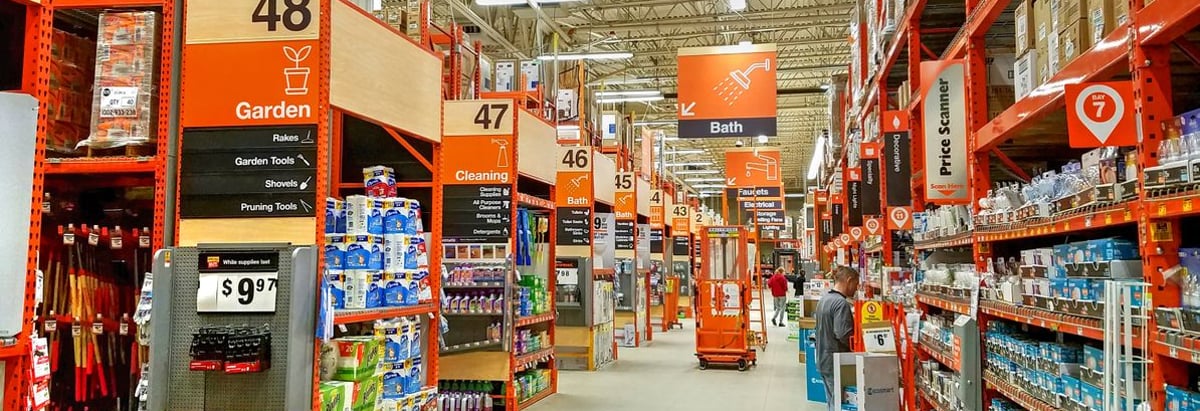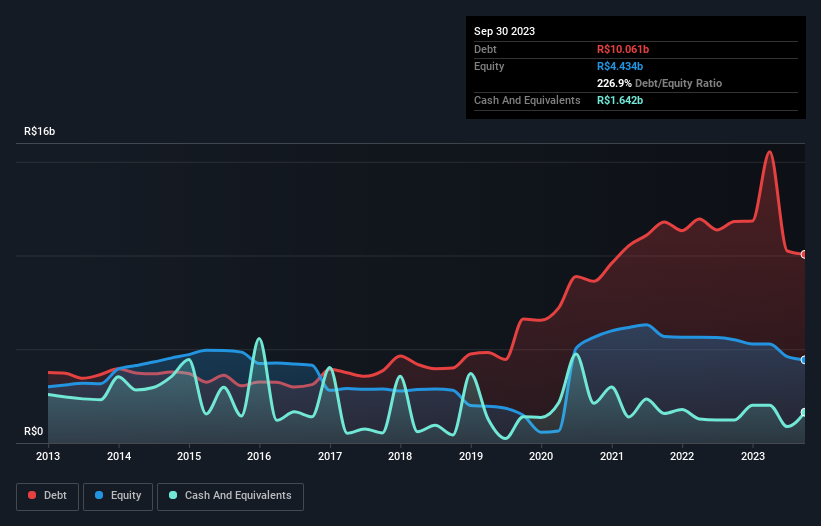- Brazil
- /
- Specialty Stores
- /
- BOVESPA:BHIA3
These 4 Measures Indicate That Grupo Casas Bahia (BVMF:BHIA3) Is Using Debt Extensively

Warren Buffett famously said, 'Volatility is far from synonymous with risk.' When we think about how risky a company is, we always like to look at its use of debt, since debt overload can lead to ruin. As with many other companies Grupo Casas Bahia S.A. (BVMF:BHIA3) makes use of debt. But is this debt a concern to shareholders?
When Is Debt A Problem?
Generally speaking, debt only becomes a real problem when a company can't easily pay it off, either by raising capital or with its own cash flow. If things get really bad, the lenders can take control of the business. However, a more frequent (but still costly) occurrence is where a company must issue shares at bargain-basement prices, permanently diluting shareholders, just to shore up its balance sheet. Of course, plenty of companies use debt to fund growth, without any negative consequences. The first step when considering a company's debt levels is to consider its cash and debt together.
See our latest analysis for Grupo Casas Bahia
How Much Debt Does Grupo Casas Bahia Carry?
As you can see below, Grupo Casas Bahia had R$10.1b of debt at September 2023, down from R$11.8b a year prior. On the flip side, it has R$1.64b in cash leading to net debt of about R$8.42b.

A Look At Grupo Casas Bahia's Liabilities
The latest balance sheet data shows that Grupo Casas Bahia had liabilities of R$18.1b due within a year, and liabilities of R$9.72b falling due after that. On the other hand, it had cash of R$1.64b and R$5.63b worth of receivables due within a year. So it has liabilities totalling R$20.6b more than its cash and near-term receivables, combined.
Given this deficit is actually higher than the company's market capitalization of R$19.8b, we think shareholders really should watch Grupo Casas Bahia's debt levels, like a parent watching their child ride a bike for the first time. In the scenario where the company had to clean up its balance sheet quickly, it seems likely shareholders would suffer extensive dilution.
We measure a company's debt load relative to its earnings power by looking at its net debt divided by its earnings before interest, tax, depreciation, and amortization (EBITDA) and by calculating how easily its earnings before interest and tax (EBIT) cover its interest expense (interest cover). Thus we consider debt relative to earnings both with and without depreciation and amortization expenses.
Grupo Casas Bahia shareholders face the double whammy of a high net debt to EBITDA ratio (12.8), and fairly weak interest coverage, since EBIT is just 0.20 times the interest expense. This means we'd consider it to have a heavy debt load. Worse, Grupo Casas Bahia's EBIT was down 71% over the last year. If earnings continue to follow that trajectory, paying off that debt load will be harder than convincing us to run a marathon in the rain. There's no doubt that we learn most about debt from the balance sheet. But it is future earnings, more than anything, that will determine Grupo Casas Bahia's ability to maintain a healthy balance sheet going forward. So if you're focused on the future you can check out this free report showing analyst profit forecasts.
But our final consideration is also important, because a company cannot pay debt with paper profits; it needs cold hard cash. So the logical step is to look at the proportion of that EBIT that is matched by actual free cash flow. Happily for any shareholders, Grupo Casas Bahia actually produced more free cash flow than EBIT over the last three years. That sort of strong cash conversion gets us as excited as the crowd when the beat drops at a Daft Punk concert.
Our View
On the face of it, Grupo Casas Bahia's interest cover left us tentative about the stock, and its EBIT growth rate was no more enticing than the one empty restaurant on the busiest night of the year. But at least it's pretty decent at converting EBIT to free cash flow; that's encouraging. We're quite clear that we consider Grupo Casas Bahia to be really rather risky, as a result of its balance sheet health. For this reason we're pretty cautious about the stock, and we think shareholders should keep a close eye on its liquidity. The balance sheet is clearly the area to focus on when you are analysing debt. However, not all investment risk resides within the balance sheet - far from it. For example, we've discovered 2 warning signs for Grupo Casas Bahia that you should be aware of before investing here.
At the end of the day, it's often better to focus on companies that are free from net debt. You can access our special list of such companies (all with a track record of profit growth). It's free.
New: Manage All Your Stock Portfolios in One Place
We've created the ultimate portfolio companion for stock investors, and it's free.
• Connect an unlimited number of Portfolios and see your total in one currency
• Be alerted to new Warning Signs or Risks via email or mobile
• Track the Fair Value of your stocks
Have feedback on this article? Concerned about the content? Get in touch with us directly. Alternatively, email editorial-team (at) simplywallst.com.
This article by Simply Wall St is general in nature. We provide commentary based on historical data and analyst forecasts only using an unbiased methodology and our articles are not intended to be financial advice. It does not constitute a recommendation to buy or sell any stock, and does not take account of your objectives, or your financial situation. We aim to bring you long-term focused analysis driven by fundamental data. Note that our analysis may not factor in the latest price-sensitive company announcements or qualitative material. Simply Wall St has no position in any stocks mentioned.
About BOVESPA:BHIA3
Grupo Casas Bahia
Grupo Casas Bahia S.A., together with its subsidiaries, retails electronics, home appliances, and furniture in Brazil.
Undervalued with adequate balance sheet.
Market Insights
Community Narratives



